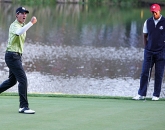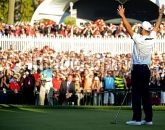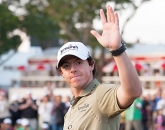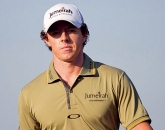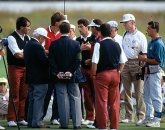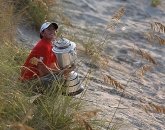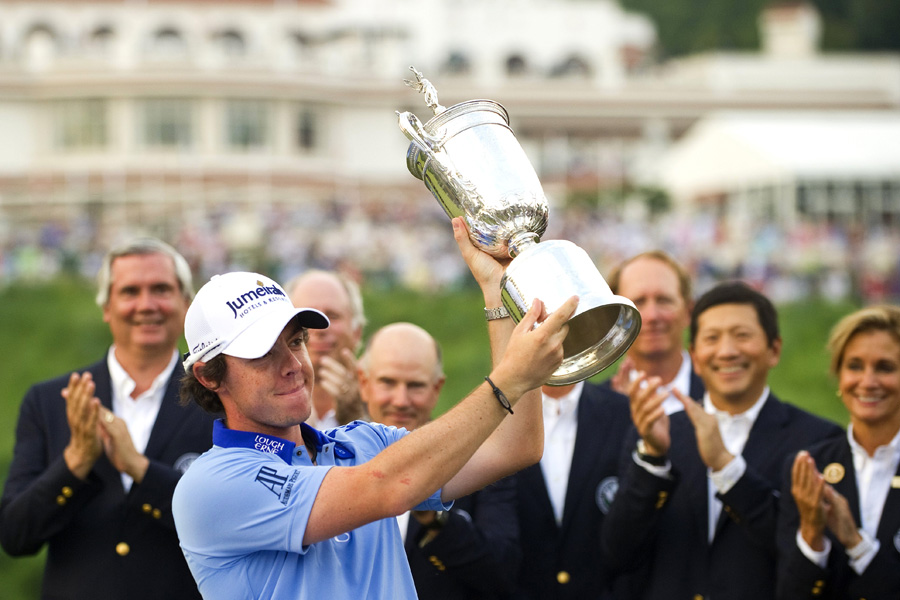 The golfing landscape has changed. One moment Tiger Woods was winning everything on what seemed like an easy stroll to passing Jack Nicklaus' record of 18 major championship victories. The next, Woods is down (if not yet completely out) and a freckly kid with untamed locks is trouncing everyone in sight and winning golf's most demanding tournament by a staggering eight shots. So superior was 22-year-old McIlroy at Congressional that his record-breaking performance brought to mind Woods' own amazing breakthrough victory at the 1997 Masters when, aged one year younger, he scorched to a 12-shot triumph. No European has ever done anything that compares. Even Nick Faldo and the late Ballesteros, acknowledged as the continent's two finest players, never bullied such a high-class field into submission quite like the Ulsterman did at Bethesda. Take nothing away from Sir Nick, but he was 33 and already a three-time major winner by the time he tamed St Andrews on his way to his most emphatic major triumph (a five-shot win) in 1990. Nobody goes out and wins their first grand slam event by eight – unless of course you're Tiger.
The golfing landscape has changed. One moment Tiger Woods was winning everything on what seemed like an easy stroll to passing Jack Nicklaus' record of 18 major championship victories. The next, Woods is down (if not yet completely out) and a freckly kid with untamed locks is trouncing everyone in sight and winning golf's most demanding tournament by a staggering eight shots. So superior was 22-year-old McIlroy at Congressional that his record-breaking performance brought to mind Woods' own amazing breakthrough victory at the 1997 Masters when, aged one year younger, he scorched to a 12-shot triumph. No European has ever done anything that compares. Even Nick Faldo and the late Ballesteros, acknowledged as the continent's two finest players, never bullied such a high-class field into submission quite like the Ulsterman did at Bethesda. Take nothing away from Sir Nick, but he was 33 and already a three-time major winner by the time he tamed St Andrews on his way to his most emphatic major triumph (a five-shot win) in 1990. Nobody goes out and wins their first grand slam event by eight – unless of course you're Tiger.
Woods, of course, was laid up at home in Florida, tending to a troublesome knee and dodgy Achilles’ tendon at the time McIlroy was en route to becoming the youngest player in 88 years to win the US Open. In all, McIlroy, who will return to our shores for this year’s UBS Hong Kong Open at Fanling in December, set 12 records, finishing with a 16-under-par 268. And he set them with the support of the American galleries behind him. Rarely has a golfer from the other side of the Atlantic been treated as such, but that’s the thing with Rors – you can’t help but like him.
“The support I got out there today was incredible, for a foreigner to come over and play in front of these crowds,” McIlroy said. “I think every cloud has a silver lining, and I think what happened at Augusta was a great thing for me in terms of support.”
Ah yes, Augusta. A little over two months previously, McIlroy succumbed dramatically when last in the spotlight. Leading by four with 18 holes to play, the tousled one lost all rhythm and composure on the back-nine at the Masters and would end up well down the field, some 12 shots behind eventual champion Charl Schwartzel.
There was no shortage of pundits who figured McIlroy’s chance had been and gone. While everyone waxed lyrical about his huge shoulder turn and natural free-flowing swing, many thought the Masters meltdown would prove too shocking a scenario for anyone to recover from, regardless of however gifted or talented they may be. Or maybe, they suggested, McIlroy just didn’t have the ‘bottle’ for the big time.
But the boy from Holywood, a medium-sized town to the north of Belfast, thought things differently. Rather than try and protect his lead by playing for pars when leading a tournament again, he realized, he should go out with all guns blazing, do what his instincts have been telling him since he first picked up a golf club: attack the golf course and not worry about what anyone else was doing.
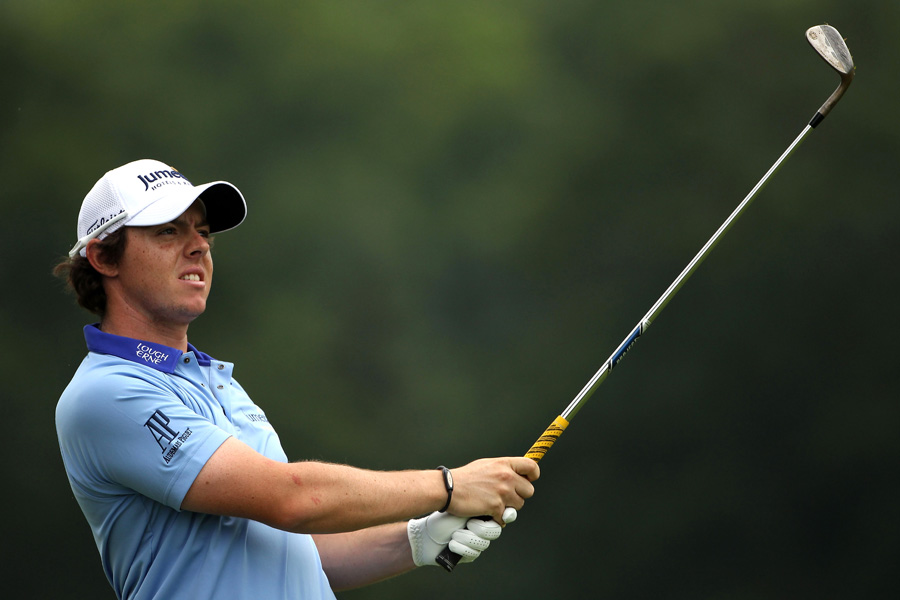 As is clear, this tactic worked rather tremendously. While it is certainly true that the celebrated Blue Course at Congressional played far softer than is typical for a venue of this championship (thunderstorms throughout the week resulted in extremely receptive greens; players were getting backspin with seven-irons), it wasn’t exactly playing easy: at over 7,400 yards, it was the second longest layout in history to host the US Open. But this suited McIlroy down to the ground. A natural drawer of the ball (something that Congressional demands), McIlroy was averaging well in excess of 310 yards during the week (he was regularly outdriving playing partner Dustin Johnson, no slouch himself, by 20 yards during the opening rounds), which combined with his sublime iron game (he hit a remarkable 86 per cent of greens in regulation) and refined short game made him simply unstoppable. And what made it all the better for the viewing public: he did this all without preamble. There’s never anything slow about the way McIlroy plays – indeed he’s one of the fastest players on tour, which at a time when five hour rounds on tour are commonplace, already makes him a very decent role model.
As is clear, this tactic worked rather tremendously. While it is certainly true that the celebrated Blue Course at Congressional played far softer than is typical for a venue of this championship (thunderstorms throughout the week resulted in extremely receptive greens; players were getting backspin with seven-irons), it wasn’t exactly playing easy: at over 7,400 yards, it was the second longest layout in history to host the US Open. But this suited McIlroy down to the ground. A natural drawer of the ball (something that Congressional demands), McIlroy was averaging well in excess of 310 yards during the week (he was regularly outdriving playing partner Dustin Johnson, no slouch himself, by 20 yards during the opening rounds), which combined with his sublime iron game (he hit a remarkable 86 per cent of greens in regulation) and refined short game made him simply unstoppable. And what made it all the better for the viewing public: he did this all without preamble. There’s never anything slow about the way McIlroy plays – indeed he’s one of the fastest players on tour, which at a time when five hour rounds on tour are commonplace, already makes him a very decent role model.
A lot has been spoken in the past about McIlroy’s somewhat suspect putting action. He has had, as we in Hong Kong well know, an unfortunate tendency to miss complete tiddlers when it mattered most. But this week he was rock solid, which can be explained by his work over the past month or so with Dave Stockton, the two-time major winner who is rapidly becoming something of a short game guru. Stockton got McIlroy to focus more on his routine – don’t bother with so many practice strokes, was the gist of it – and now he doesn’t take any. “It seemed to work,” said McIlroy with a smile.
Comparisons with Woods are understandable – but before we get completely carried away let’s take a moment to remember that his US Open win was only his third professional victory – although McIlroy himself is having none of it. He accepts compliments with grace yet is quick to distance himself from any such talk.
When Padraig Harrington said McIlroy would be the first player to break Nicklaus’ record of 18 major championships, the youngster was clearly embarrassed.
“Paddy, Paddy, Paddy, I’m trying to win my first,” he said.
McIlroy, a bright lad who left school at 16 to turn pro, realizes that he, especially in light of the Tiger scandal and the ensuing loss of form that came with it, is the one that the media craves. The Press needs a story – and right now, Rory’s the biggest of them all. He says he can handle it, and who are we to argue. Everyone – even the very greatest – finds difficulty with their game at some point in time, but it would be a huge surprise if McIlroy doesn’t add to his major tally – and soon. Certainly Graeme McDowell, the dethroned US Open champion and McIlroy’s close friend, agrees.
“Nothing this kid does ever surprises me,” said McDowell. "He’s the best player I’ve ever seen. He’s great for golf. He’s a breath of fresh air for the game, and perhaps we’re ready for golf’s next superstar, and maybe Rory is it.”
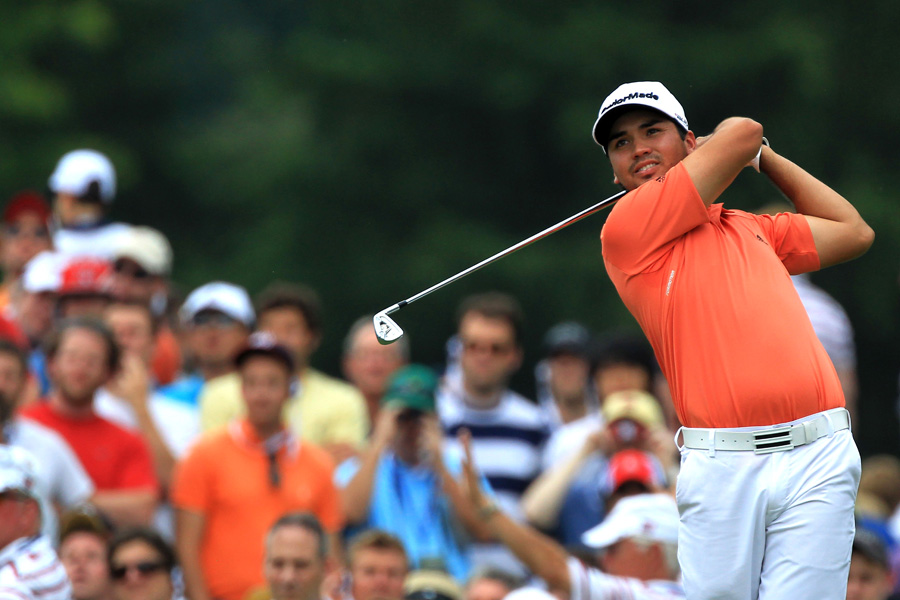 Golf is primed for McIlroy. The game has been on the look out for a Tiger replacement and with the likes of Jason Day, who finished second behind McIlroy in Bethesda for this second consecutive major runner-up spot, Schwartzel, Ryo Ishikawa and Rickie Fowler, all coming to the fore in recent times, this new generation, spearheaded by the lad from Northern Ireland, has the potential to be leading the sport for the next decade or more.
Golf is primed for McIlroy. The game has been on the look out for a Tiger replacement and with the likes of Jason Day, who finished second behind McIlroy in Bethesda for this second consecutive major runner-up spot, Schwartzel, Ryo Ishikawa and Rickie Fowler, all coming to the fore in recent times, this new generation, spearheaded by the lad from Northern Ireland, has the potential to be leading the sport for the next decade or more.
It’s far too early for talk of McIlroy catching Nicklaus – one down, seventeen to go – but the Golden Bear, who was a few months older than Rory when he won his first major – is a definite fan.
“I love his moxie, the sort of way he walks, sort of cocksure about himself,” Nicklaus said. “I kind of like that in a guy. You’ve got to have confidence in what you’re doing. I think this kid’s going to have a great career. He’s got all the components; he’s got lots of people rooting for him.”


